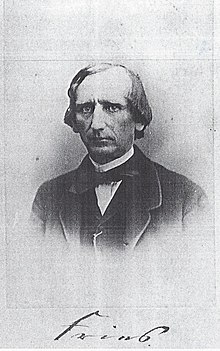German judge, politician and lawyer From Wikipedia, the free encyclopedia
Hugo Friedrich Fries (/ˈhjuɡoʊ ˈfridrɪk fraɪz/;[1] German pronunciation: [hu:gɔ fri:drɪç fri:s];[2] 9 January 1818 – 25 March 1889). sometimes spelt Frieze, was a German judge, and son of Jakob Friedrich Fries. Before and after the founding of the German Reich, he was a member of the Reichstag. His son, Otto Fries (1849–1905), a forester, was also a member of the Reichstag.[3]
Hugo Friedrich Fries | |
|---|---|
 Portrait of Hugo Friedrich Fries, c. 1870 | |
| Mayor of Bad Berka | |
| In office 1848–1850 | |
| Chairman of the Municipal Council of Weimar | |
| In office 1862–1874 | |
| President of the Landtag of Thuringia | |
| In office 1865–1889 | |
| Personal details | |
| Born | 9 January 1818 Jena, German Confederation |
| Died | 25 March 1889 (aged 71) Weimar, German Empire |
| Nationality | German |
| Political party | National Liberal Party |
| Parent(s) | Jakob Friedrich Fries Eleonore Fries |
| Education | University of Göttingen University of Jena |
| Signature | |
Fries studied law at the University of Göttingen and the University of Jena (1837–1840). After graduating, he joined the civil service of the Grand Duchy of Saxe-Weimar-Eisenach. He was a lawyer in Berka from 1845 to 1850, and became its mayor from 1848 to 1850. He then moved to Weimar in 1850 and continued working there as a lawyer, later becoming a member of the municipal council in 1853. He become one of the founders of the German National Association in 1859. He became a member of the National Liberal Party of Germany from 1870 onwards.
He was a member of the Thuringian Landtag and became its president from 1865 to 1889. In February 1867 he arrived in the Reichstag (North German Confederation) and the Customs Parliament.[4] From the general election in 1871 until the general election in 1874 he sat for the National Liberal Party in Reichstag. He was a representative of the constituency Weimar 1 (Weimar-Apolda).[5]
Seamless Wikipedia browsing. On steroids.